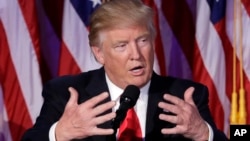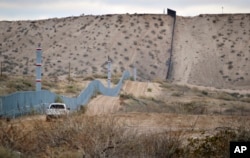U.S. President-elect Donald Trump says he will deport 2 million to 3 million undocumented immigrants who have criminal records when he assumes power and will keep his campaign pledge to build a wall along the U.S.-Mexican border to thwart the stream of illegal migration into the country.
“What we are going to do is get the people that are criminal and have criminal records, gang members, drug dealers, where a lot of these people, probably two million, it could be even three million, we are getting them out of our country or we are going to incarcerate," Trump told the CBS network's “60 Minutes” show. “But we’re getting them out of our country. They’re here illegally.”
Building a wall
In an excerpt of the interview released before airing Sunday night, Trump said that he intends to build the wall, a favorite campaign promise for his most devoted supporters, but that part of the barrier might be "some fencing."
The blunt-spoken real estate mogul said, "I'm very good at this, it's called construction." He has vowed to get Mexico to pay for the wall, but the U.S.'s southern neighbor says it will not.
Overall, about 11 million undocumented immigrants live in the United States, but Trump said that after the border is secure and the initial group of law-breaking immigrants is deported, his government would decide what to do with the remaining millions of undocumented migrants.
"After the border is secure and after everything gets normalized," he said, "we’re going to make a determination on the people that they’re talking about who are terrific people. They’re terrific people, but we are gonna make a determination at that. But before we make that determination ... it’s very important, we are going to secure our border.”
In the interview, Trump, who vowed during the campaign to dismantle President Barack Obama's signature health care reforms, said he would keep parts of the program, including a provision banning insurers from denying coverage to those with major preexisting health conditions. Trump surrogates have also suggested that he may abandon or reshape other favorite campaign pledges, but he has yet to detail many of his intentions.
Trump is working quickly to shape his new government, even as thousands of protesters are taking to the streets in major cities in nightly demonstrations against his election.
Chief of staff selection
Meanwhile, Trump's administration is beginning to take shape. He announced Sunday that Republican National Committee chairman Reince Priebus will be his new chief of staff -- the highest-ranking White House employee, who is basically the top assistant to the president.
He also named right-wing media executive Steve Bannon as his chief strategist and counselor.
Trump calls both "highly qualified leaders."
Priebus called the appointment "an honor," and predicted Trump will be "a great president for all Americans."
Bannon said, "We had a very successful partnership on the campaign, one that led to victory. We will have that same partnership in working to help President-elect Trump achieve his agenda."
Other top names reportedly being considered for senior jobs include former New York Mayor Rudy Giuliani as attorney general and Alabama Senator Jeff Sessions as defense secretary.
EU foreign ministers
Meanwhile, most of the European Union foreign ministers were meeting Sunday in Brussels to discuss the impact of Trump's election on trans-Atlantic relations and how it might complicate the West's contentious standing with Russia, whose leader, President Vladimir Putin, Trump often praised during his campaign. The British and French foreign ministers were staying away from the meeting, saying they objected to the Trump-related discussions.
Much of Europe was shocked by Trump's election because of his suggestion during the campaign that the U.S. revisit its support for NATO, which has been a bedrock U.S.-European military alliance since the end of World War II. EU Commission President Jean-Claude Juncker said Trump poses risks for the relationship.
"I believe we'll have two years of wasted time while Mr. Trump tours a world he doesn't know," Juncker said, referring to Trump's lack of solid foreign policy priorities that has kept much of the world guessing as to his intents.
Watch video report from VOA's Zlatica Hoke:







